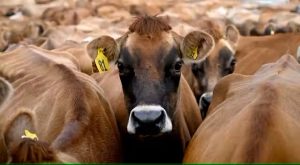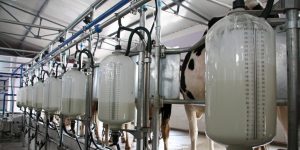
The recent announcement that the word Meat will be dropped from the Beyond Meat name reveals something that many in the dairy industry sensed: the plant-based phenomenon was not as invincible as it was made out to be.
For years, the rhetoric of a “plant-based future” without animals echoed strongly across global markets. Companies like Beyond Meat became symbols of a food revolution that aimed to dethrone meat and, in the process, push dairy off the shelves.
However, Beyond’s recent results — and the announcement that it is removing the word “Meat” from its name — reveal what many in the dairy sector had long suspected: the plant-based phenomenon is not as invincible as it once appeared.
A Change of Direction That Speaks Volumes
Beyond Meat, the US-based company that captivated investors in 2019 with its promise to replicate the taste of meat without using animals, is facing its most critical moment.
Its sales have fallen quarter after quarter, the figures are deep in the red, and its shares — once worth over $100 — are now hovering around $3.
Now, in a desperate rebranding attempt, the company is dropping the word “Meat” and rebranding simply as “Beyond”. CEO Ethan Brown justified the move by stating that their mission is no longer to mimic meat but to offer plant-based protein in all its forms.
Translation: the business model of replacing animal products isn’t delivering the expected results, so it’s time to craft a new narrative.
Why Did the Consumer Turn Away?
The numbers speak for themselves. In Q1 2025, Beyond Meat reported a 9.1% drop in sales and losses totalling $52.9 million.
While there was a modest 12.1% rise in international foodservice sales, retail volumes stalled. Why? Consumers around the world are citing the same reasons:
- Unconvincing taste and texture
- Prices too high for a product perceived as artificial
- Ingredient lists that spark distrust
The narrative that dairy and meat are environmental and health “villains” has lost ground in light of evidence showing that many plant-based substitutes are ultra-processed.
And when a consumer reads a label with 20 unpronounceable ingredients, they tend to look more fondly at their trusted milk, yoghurt or cheese.
The Plant-Based Boom Is Deflating — But Not Disappearing
While sales of plant-based alternatives have declined or slowed in most markets, the sector should not be underestimated.
Beyond is repositioning itself with simpler recipes (its new Beyond Ground line will contain just four ingredients) and a more diverse offering: lentil sausages, chickpea hot dogs, broad bean burgers…
For the dairy industry, this means competition no longer comes solely from “imitations” of milk or cheese, but from a broader array of products vying for a share of the protein market.
A Golden Opportunity for Dairy
As the plant-based narrative falters, dairy has a unique opportunity to strengthen its positioning:
- Naturalness and tradition. Milk, cheese and yoghurt are ancient foods that require no complex processing.
- High-quality protein. Dairy protein’s bioavailability remains unmatched by substitutes.
- Innovation with authenticity. The industry can invest in healthier, more sustainable products that still honour its identity.
In short: it’s time to stop reacting to plant-based marketing and go on the offensive — communicating what consumers truly value: real, nutritious and accessible food.
The Plant-Based Narrative Is Running Out of Steam
Ethan Brown has accused the industry of “demonising” the processes behind plant-based alternatives.
But the truth is, consumers are no longer buying the story of a “miracle product” that will save the planet. If Beyond is dropping “Meat” from its name, it’s also signalling that the original narrative no longer sells.
The 2030 Agenda, which for years championed plant-based alternatives as “the sustainable solution”, is beginning to lose momentum in the face of hard data: consumers want more natural, less industrialised — and above all, tastier — options.
United States, New Zealand and India: Three Distinct Realities
In the United States, the birthplace and epicentre of the plant-based boom, Beyond Meat’s decline symbolises a broader disenchantment with the promises of this category.
The American consumer, once enthusiastic, is now overwhelmed by choices and increasingly focused on price, simplicity, and naturalness — all areas where traditional dairy products have a strong advantage.
As confidence in ultra-processed “miracle” alternatives wanes, dairy is quietly regaining ground.
In New Zealand, dairy is not just a major industry — it’s a pillar of national identity and economic strength.
The sector has remained resilient, capitalising on global concerns about plant-based substitutes to reinforce its positioning as a producer of high-quality, sustainable dairy.
Kiwi exporters continue to lead the way in markets where trust, traceability and premium value matter most.
Meanwhile, in India, where dairy is deeply tied to culture, religion and tradition, plant-based alternatives have found only a narrow, urban niche.
Milk remains a daily staple — both nutritionally and spiritually — and dairy continues to enjoy widespread trust across all segments of society.
Argentina, Brazil and the Latin American Pulse
In Latin America, the plant-based segment never reached the heights seen in the US or Europe. In Brazil, consumers remain loyal to their milk and cheese; in Argentina, price is a key barrier to adoption of plant-based alternatives.
The global weakening of the plant-based trend may further slow investment in this category across the region, where deeply rooted preferences and economic constraints strongly influence purchasing decisions.
What Should the Dairy Sector Do?
The message is clear: this is not a time to gloat over a rival’s misfortune, but to seize the opportunity:
- Clearly communicate the nutritional benefits of dairy protein
- Defend the image of natural and authentic products
- Invest in innovation (sustainable packaging, reduced environmental footprint) to counter the plant-based “green” argument
- Strengthen presence in channels where plant-based still grows — such as foodservice and premium export
The Future Is Written in Milk
The weakening of the plant-based boom confirms what many producers already knew: fads fade, but milk endures.
Beyond and similar companies may reinvent themselves time and again, but as long as their offerings remain expensive, artificial, and disconnected from cultural food traditions, they are unlikely to dethrone dairy.
For the dairy sector, now is the time to reclaim the narrative. Consumers want protein, yes — but they also want taste, heritage and trust. Three qualities the dairy industry has in abundance.
And while Silicon Valley changes logos and scripts, dairy farms and processing plants across the world continue doing what they’ve always done best: producing real, nutritious and delicious food.
Valeria Hamann
EDAIRYNEWS
You can now read the most important #news on #eDairyNews #Whatsapp channels!!!
🇺🇸 eDairy News INGLÊS: https://whatsapp.com/channel/0029VaKsjzGDTkJyIN6hcP1K

























